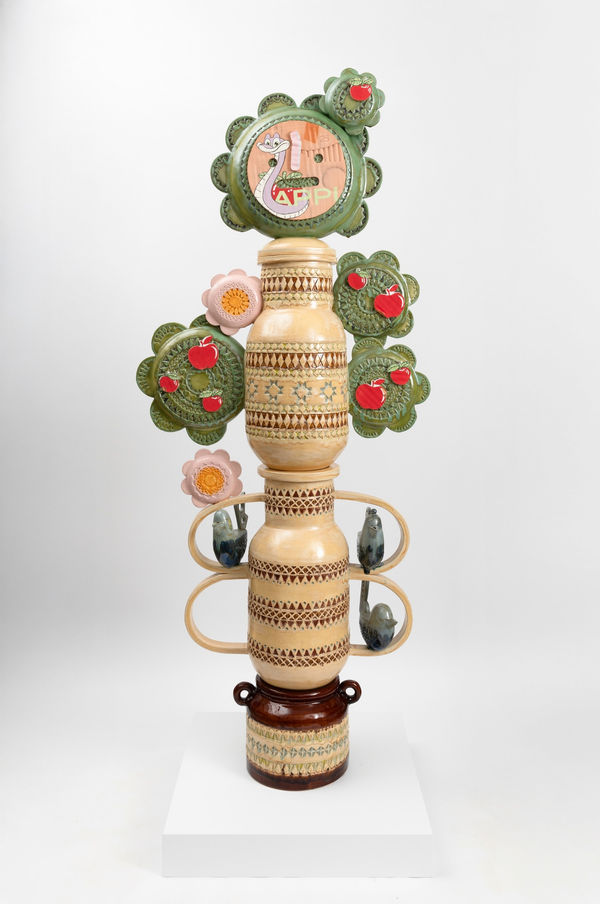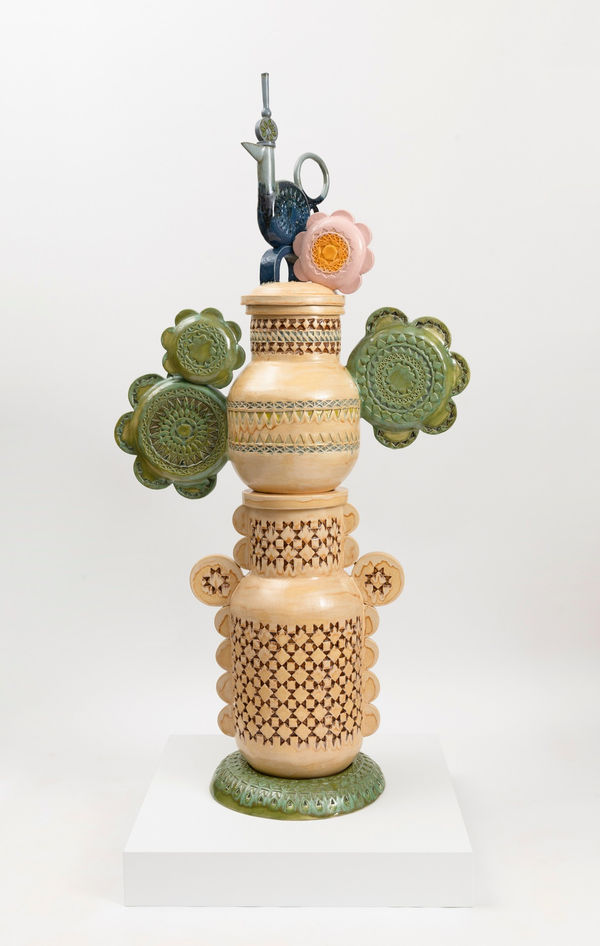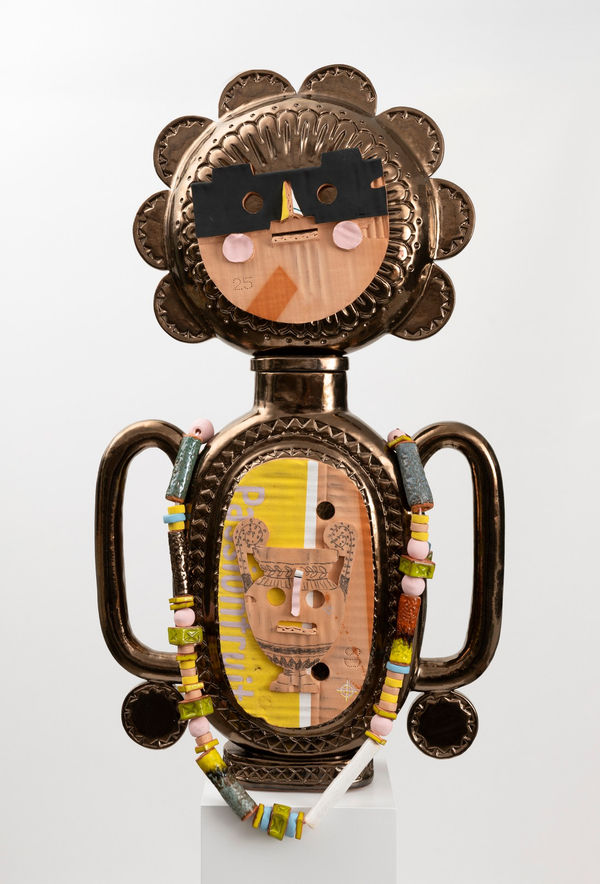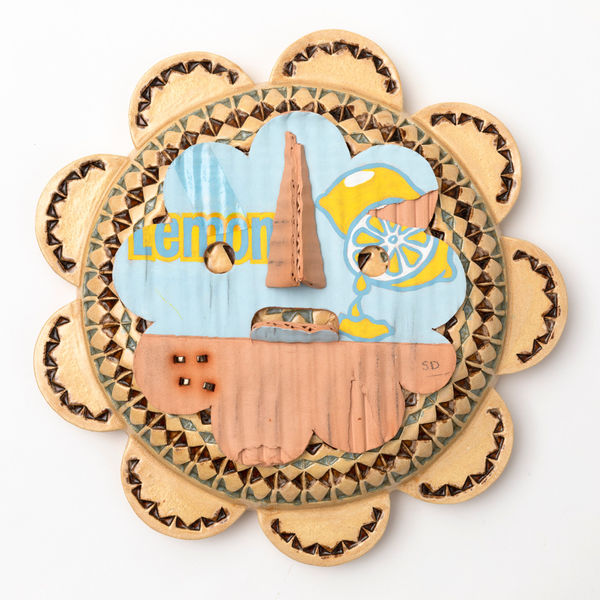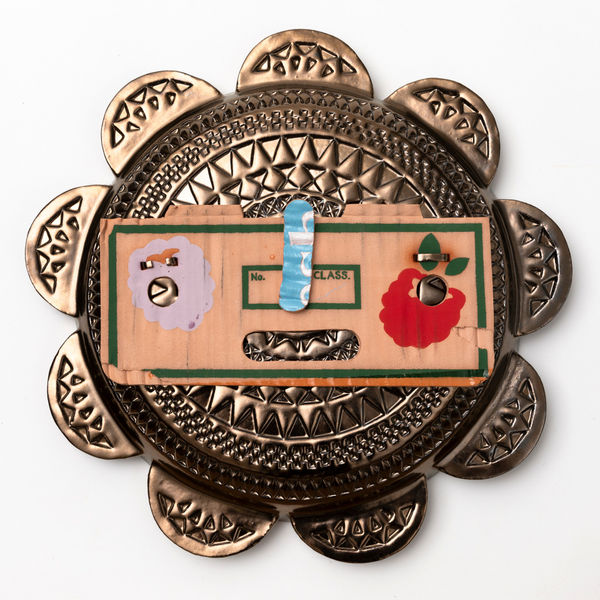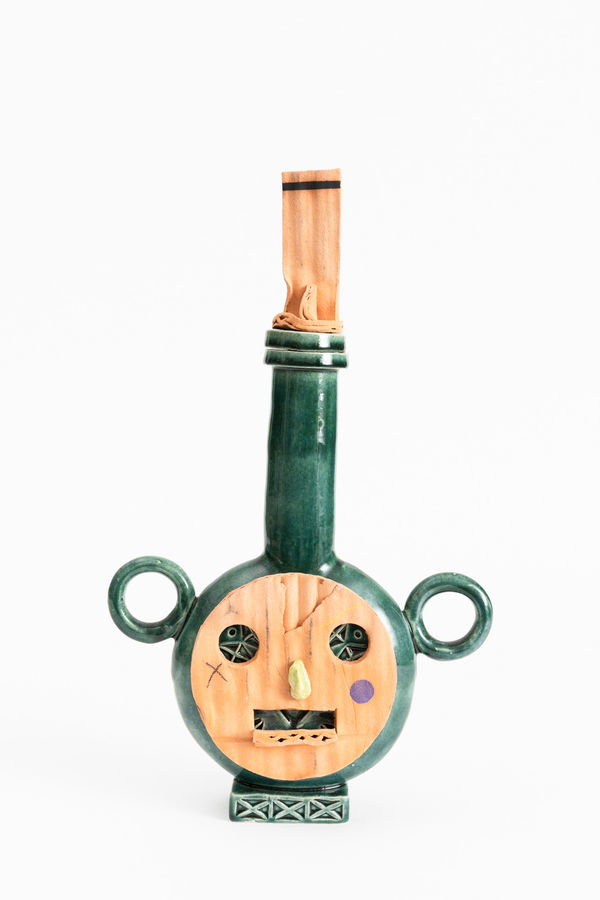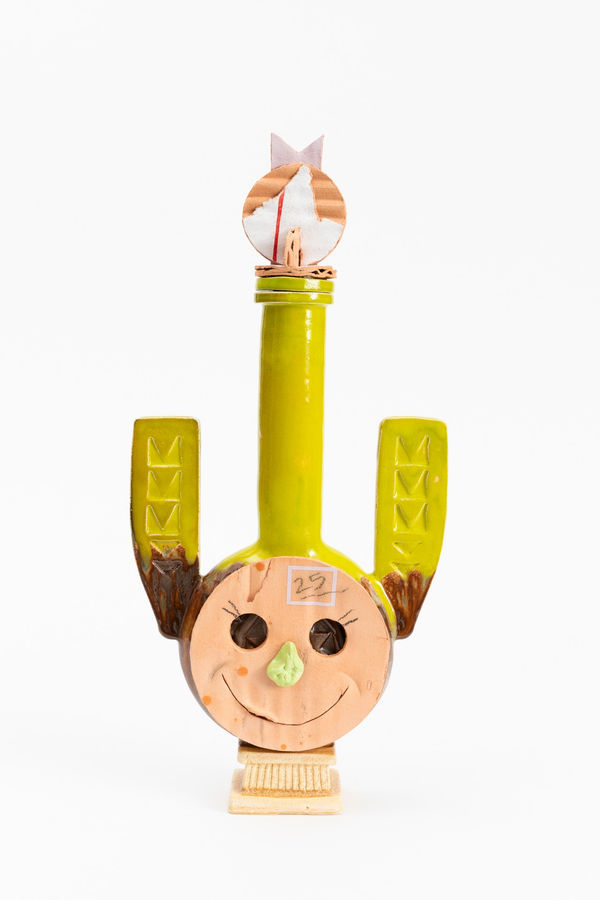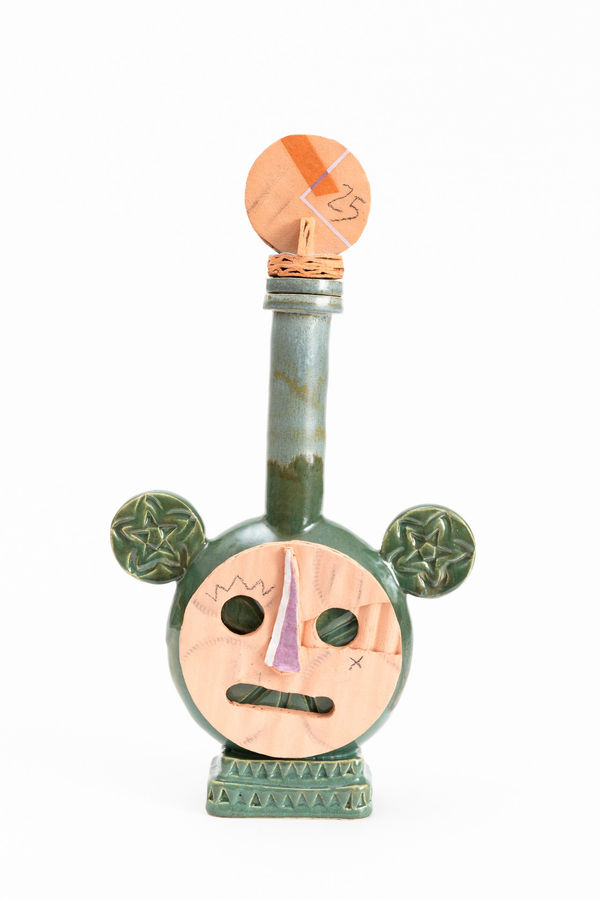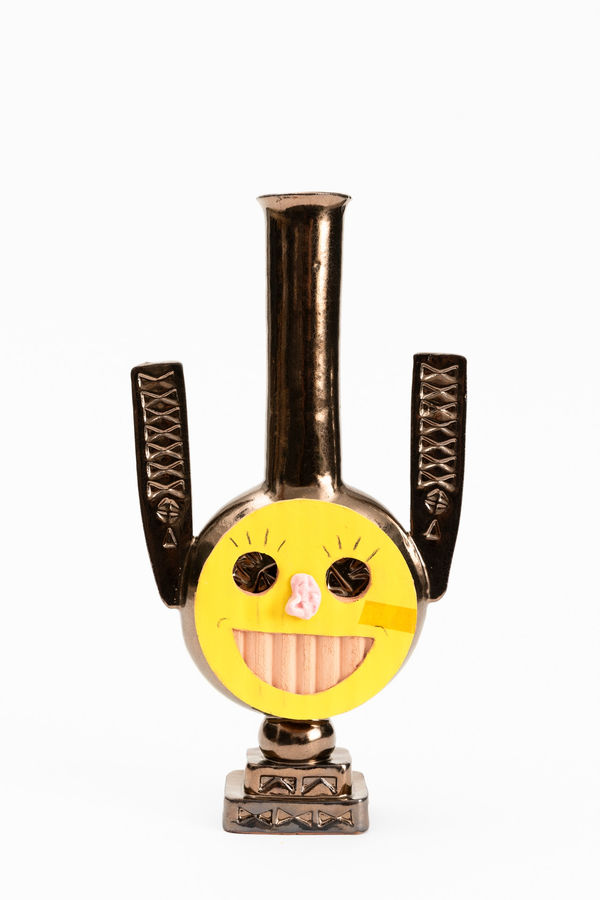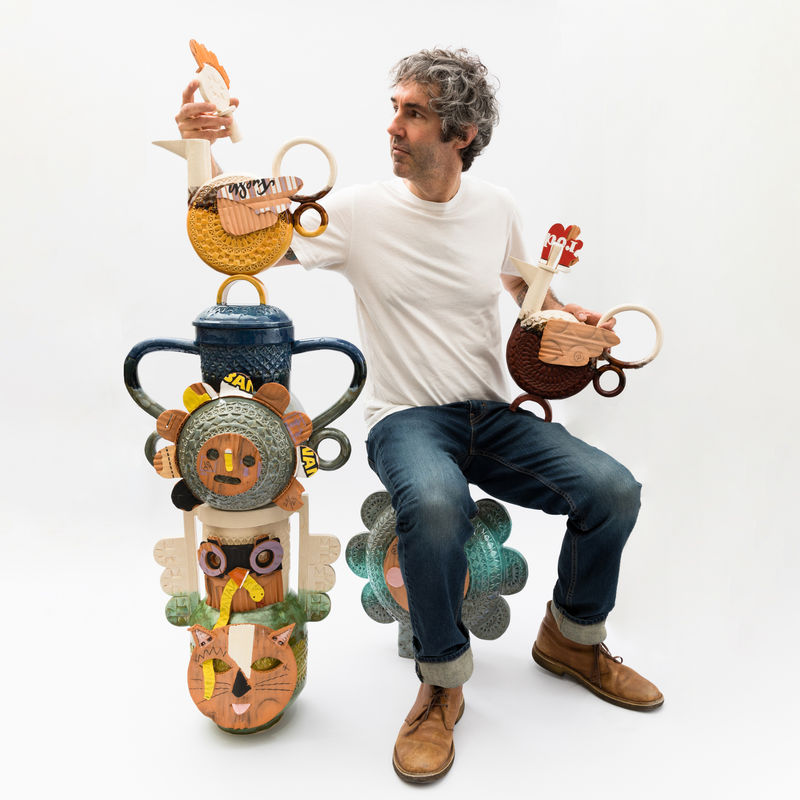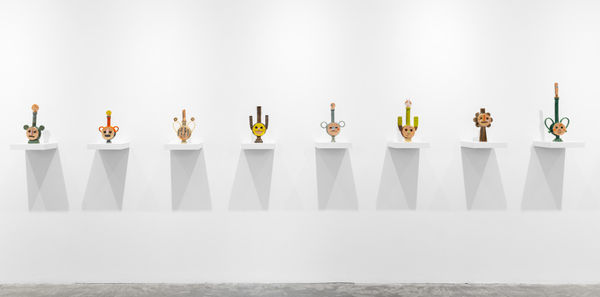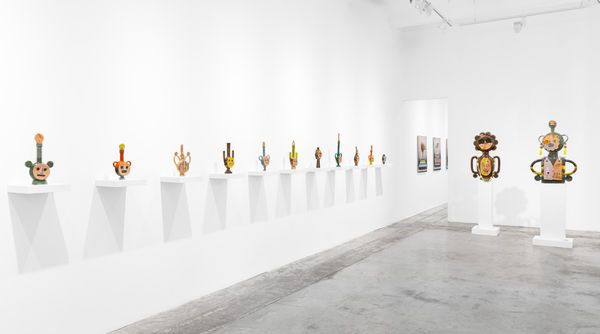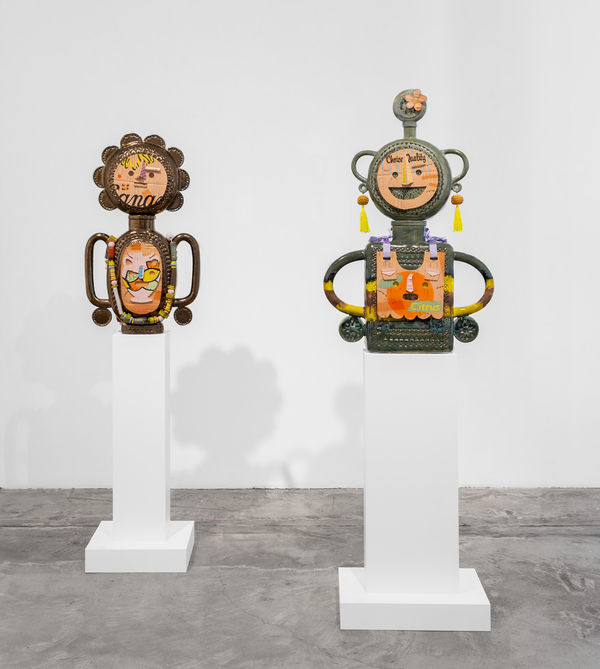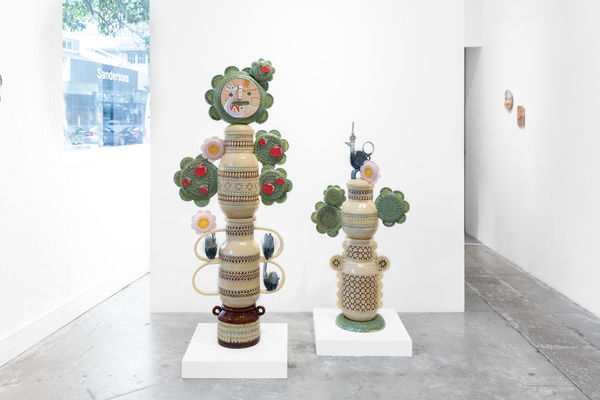Scott Duncan: Garden of Earthenware Delight
-
 Scott DuncanGarden of Earthenware Delight II, 2025glazed earthenware173 x 80 x 30 cm (artwork), 183 x 80 x 60 cm (display)Sold
Scott DuncanGarden of Earthenware Delight II, 2025glazed earthenware173 x 80 x 30 cm (artwork), 183 x 80 x 60 cm (display)Sold -
 Scott DuncanGarden of Earthenware Delight I, 2025glazed earthenware134 x 68 x 36 cm (artwork), 144 x 68 x 60 cm (display)Sold
Scott DuncanGarden of Earthenware Delight I, 2025glazed earthenware134 x 68 x 36 cm (artwork), 144 x 68 x 60 cm (display)Sold -
 Scott DuncanChoice quality, 2025glazed earthenware, ribbon, bricklayers twine102 x 65 x 19 cm (artwork), 202 x 65 x 38 cm (display)
Scott DuncanChoice quality, 2025glazed earthenware, ribbon, bricklayers twine102 x 65 x 19 cm (artwork), 202 x 65 x 38 cm (display) -
 Scott DuncanBronze figure with passionfruit, 2025glazed earthenware90 x 52 x 19 cm (artwork), 190 x 52 x 38 cm (display)Sold
Scott DuncanBronze figure with passionfruit, 2025glazed earthenware90 x 52 x 19 cm (artwork), 190 x 52 x 38 cm (display)Sold -
 Scott DuncanMoody bandit, 2025glazed earthenware42 x 42 x 10 cm
Scott DuncanMoody bandit, 2025glazed earthenware42 x 42 x 10 cm -
 Scott DuncanBitter tears, 2025glazed earthenware42 x 42 x 12 cmSold
Scott DuncanBitter tears, 2025glazed earthenware42 x 42 x 12 cmSold -
 Scott DuncanBronze wallflower, 2025glazed earthenware41 x 41 x 10 cmSold
Scott DuncanBronze wallflower, 2025glazed earthenware41 x 41 x 10 cmSold -
 Scott DuncanCitrus sunshine, 2025glazed earthenware40 x 40 x 10 cm
Scott DuncanCitrus sunshine, 2025glazed earthenware40 x 40 x 10 cm -
 Scott DuncanTall greenie, 2025glazed earthenware53 x 23 x 8 cm
Scott DuncanTall greenie, 2025glazed earthenware53 x 23 x 8 cm -
 Scott DuncanSunny Jim, 2025glazed earthenware19 x 16 x 7 cm
Scott DuncanSunny Jim, 2025glazed earthenware19 x 16 x 7 cm -
 Scott DuncanJade bottle, 2025glazed earthenware36 x 23 x 8 cmSold
Scott DuncanJade bottle, 2025glazed earthenware36 x 23 x 8 cmSold -
 Scott DuncanStripey, 2025glazed earthenware31 x 22 x 7 cm
Scott DuncanStripey, 2025glazed earthenware31 x 22 x 7 cm -
 Scott DuncanSticky nose, 2025glazed earthenware39 x 19 x 7 cmSold
Scott DuncanSticky nose, 2025glazed earthenware39 x 19 x 7 cmSold -
 Scott DuncanSolar sceptre, 2025glazed earthenware31 x 18 x 8 cm
Scott DuncanSolar sceptre, 2025glazed earthenware31 x 18 x 8 cm -
 Scott DuncanHeavy lids, 2025glazed earthenware30 x 18 x 8 cm
Scott DuncanHeavy lids, 2025glazed earthenware30 x 18 x 8 cm -
 Scott DuncanCadmium ladmium, 2025glazed earthenware30 x 16 x 8 cm
Scott DuncanCadmium ladmium, 2025glazed earthenware30 x 16 x 8 cm -
 Scott DuncanGrillz, 2025glazed earthenware37 x 24 x 8 cm
Scott DuncanGrillz, 2025glazed earthenware37 x 24 x 8 cm -
 Scott DuncanGavin, 2025glazed earthenware36 x 20 x 8 cmSold
Scott DuncanGavin, 2025glazed earthenware36 x 20 x 8 cmSold -
 Scott DuncanBottle of hayfever / Antihistamines of the Etruscans, 2025glazed earthenware33 x 19 x 8 cm
Scott DuncanBottle of hayfever / Antihistamines of the Etruscans, 2025glazed earthenware33 x 19 x 8 cm -
 Scott DuncanBig ears, 2025glazed earthenware36 x 23 x 7 cm
Scott DuncanBig ears, 2025glazed earthenware36 x 23 x 7 cm -
 Scott DuncanAcid trophy, 2025glazed earthenware33 x 18 x 8 cmSold
Scott DuncanAcid trophy, 2025glazed earthenware33 x 18 x 8 cmSold -
 Scott DuncanTriple Gourd, 2023earthenware with glaze, wool, nylon62 x 24 x 14 cm
Scott DuncanTriple Gourd, 2023earthenware with glaze, wool, nylon62 x 24 x 14 cm -
 Scott DuncanBananas, 2024earthenware with glaze, wool, nylon60 x 23 x 12 cm
Scott DuncanBananas, 2024earthenware with glaze, wool, nylon60 x 23 x 12 cm -
 Scott DuncanGoldie, 2023earthenware with glaze44 x 24 x 13 cm
Scott DuncanGoldie, 2023earthenware with glaze44 x 24 x 13 cm -
 Scott DuncanBlue Bottle, 2023earthenware with glaze39 x 23 x 13 cm
Scott DuncanBlue Bottle, 2023earthenware with glaze39 x 23 x 13 cm -
 Scott DuncanToastie, 2023earthenware with glaze39 x 23 x 13 cm
Scott DuncanToastie, 2023earthenware with glaze39 x 23 x 13 cm -
 Scott DuncanFresh Slacks, 2024earthenware with glaze59 x 19 x 13.5 cm
Scott DuncanFresh Slacks, 2024earthenware with glaze59 x 19 x 13.5 cm -
 Scott DuncanLamby, 2024earthenware with glaze23 x 23 x 3 cmSold
Scott DuncanLamby, 2024earthenware with glaze23 x 23 x 3 cmSold -
 Scott DuncanPerforated Oblong, 2023earthenware with glaze21 x 15 x 3 cmSold
Scott DuncanPerforated Oblong, 2023earthenware with glaze21 x 15 x 3 cmSold
Scott Duncan’s whimsical sculptures function as both ode to and subversion of the history and traditions of ceramics. Inspired by motifs of the past – ‘70s nostalgia, mid-century design, West German and Italian pottery and classical Greco-Roman vessels – the artist creates hybrid forms that effortlessly traverse epochs while honouring the long history of anthropomorphism in pottery. In his self-described “blank expressionism”, clay-cardboard faces resembling cut-outs from commercial fruit and vegetable boxes adorn pastiches of ancient forms as Duncan invites viewers to reconsider the merit of the material world and the tattered polarities of ‘high’ and ‘low’ in art.
A chef by trade, Duncan’s art practice sees kitchen and studio overlap formally and conceptually, merging culinary precision with creative exploration. Everything is crafted by hand, without any moulding, casting or even the use of a slab roller – a fastidious approach that ensures there are rarely any kiln casualties. Working to the fitting lo-fi sounds of garage rock, Duncan manually rolls out his clay like lasagne sheets, carefully layering each piece as if making shortcrust pastry. He embraces the monotony and meticulousness of this process as a meditative act and means to escape the strictures of the mind into the primality of the hands. The artist works intuitively, cooking up forms and ideas along the way – “You can’t really make any mistakes when working this way!”, he jokes. Often he’ll sketch preliminary ideas onto his concrete work bench, the pencil markings slowly consumed by the clay as he works – ideas literally entombed in each sculpture.
The titlepiece of Duncan’s new series, ‘Garden of Earthenware Delight’, presents a stack of retro-meets-Roman pots configured into a blossoming tree with a fruit-box face, a cartoon snake and immaculate red apples. This clever theological allusion hedges the hamartia of humanity with modern notions of consumption, perfection and temptation. The Edenic triad – tree, apple, snake – rendered with a cartoon aesthetic conflates innocence with transgression, the warm shine of childhood with the mythological shadows of human history, hatching at once a critique, a celebration, and a question about what ‘Eden’ means to us today.
In this work, and the show itself, the titular reference to Hieronymus Bosch’s triptych The Garden of Earthly Delights (1490-1510) creates a layered homage to the art and act of ceramics; the delight of clay, whilst also signalling the transience of earthly/earthenware pleasure. This ripples into notions of impermanence, which Duncan explores through his ceramic cardboard cut-outs executed with impressive trompe-l’oeil. The industrial detritus of corrugated cardboard is a salient motif throughout Duncan’s oeuvre, colliding – or rather coalescing – with the precious permanence of the ceramic form. In an era dominated by online shopping and doorstep deliveries, the ubiquitous cardboard box has become a silent witness to the rhythms of modern life and the labyrinthine networks that sustain contemporary consumption.
For the first time in his practice, Duncan eschews conventional constructs of ‘front’ and ‘back’, simultaneously bringing an interactive tenor to his sculptures. Each pot has a hole through the base on a central pole, such that the stacked configuration can be changed. Some works feature double-sided heads that can be turned, ear-like handles with removeable tassel earrings, draped strings of handmade beads, and figurative torsos adorned with adjustable clay-cardboard ‘garments’ so the viewer can dress the work. This playful modularity and alluring tactility draws on the tradition of the paper doll, a symbol of transformation and identity. The act of dressing and undressing the work mirrors the way we construct and reconstruct our own identities, layering selves like garments, embracing fluidity over fixity. By handing a degree of authorship to the viewer, Duncan dilutes the threshold between artist and audience, turning play into a profound meditation on impermanence, agency, and the ever-changing nature of self-expression.
Scott Duncan transforms ceramics into a site of interaction and reflection. From cardboard to classicism, the artist delights in illusion and allusion, creating hybrid forms that summon deep contemplation whilst also, in the artist’s own words, “simply bringing good vibes!”
– Elli Walsh, Principal Writer, Artist Profile
